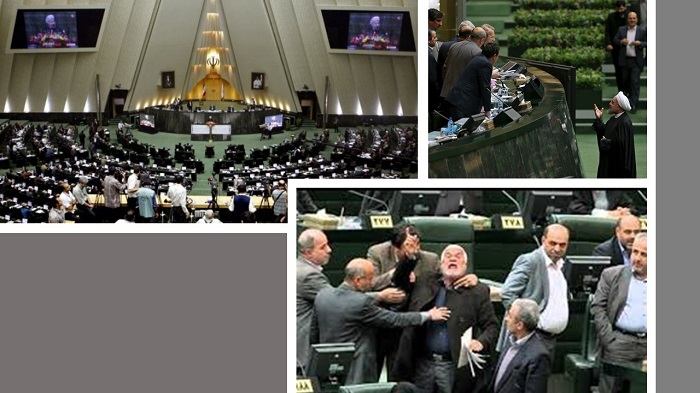
Coming parliamentary election in Iran is a scene of infighting in a desperate regime
Iran’s faltering regime is preparing for parliamentary elections on February 21st while protests still rage in cities across the country. The dissatisfaction with the ruling regime has now spread to Supreme Leader Ali Khamenei himself, as the leaders of various factions argue over the future of Iran in the face of widespread unrest and growing international isolation.
A Problem of Election Legitimacy
Iran does not have true elections under the mullahs’ principle of Velayat-e Faqih, or absolute clerical rule. Opposition parties are forbidden from running for Majlis (Parliament) or from existing at all. Regime factions must be approved by the Guardian Council, which is appointed by the Supreme Leader, and all candidates must swear their loyalty to the Supreme Leader to participate in elections. Under these rigid rules, regime elections function more as selections of approved candidates and offer no real choices for the people of Iran. Even if Majlis members managed to pass reasonable legislation, they could be overruled by the Supreme Leader and Guardian Council.
MEK Iran: Legislative Election in Iran Solidifying a Dissolving State https://t.co/1wCi1OGrW2#Iran #FreeIran2020 #MEK @USAdarFarsi
— MEK Iran (Mujahedin-e Khalq) (@MEK_Iran) February 2, 2020
The mullahs maintain the facade of legitimacy by claiming high voter turnout at their elections, but widespread unrest throughout the country has led to a weakening of factions. Currently, more than half of Majlis candidates belong to the same faction, and there is concern about voter participation.
Regime President Hassan Rouhani has tried to play to both sides of this dilemma, acknowledging that there is no competition in the election and comparing the situation to the Shah’s dictatorship, while simultaneously asking the Iranian people to participate in the election in order to “preserve the system.”
Insiders Question Legitimacy of Supreme Leader
With the regime crumbling around them, those in its inner circles are beginning to focus on self-preservation. The people are demanding the overthrow of the regime in its entirety, and some insiders have begun to wonder if the bulk of the government could be saved if the Supreme Leader were to be discarded.
Rouhani cannot stop Khamenei from disqualifying his candidates, and Khamenei cannot bring about a single-faction parliament under his complete control. The real winner of the regime’s election crisis is the Iranian people.#Iranhttps://t.co/ejWzlaDRsE
— People's Mojahedin Organization of Iran (PMOI/MEK) (@Mojahedineng) January 29, 2020
In a recent meeting, Mustafa Tajzadeh, former regime Interior Minister and member of the Line of the Imam [Khomeini] faction, described the Supreme Leader as the source of the current crises facing Iran. He said: “The absolute rule of the clergy should not have been included in the constitution…When a disease is so acute that it cannot be resolved except by surgery, every reasonable person goes through surgery to continue their lives. Because they know if they don’t, they will sooner or later get into trouble. The fact is that our system has reached a point where it cannot continue except after going through major surgeries. The most important surgery is constitutional reform. We must stand. The fact that I have some disagreement with my friends is that I now believe that the importance of being or not being in the Parliament is that we have to tell the people that after 40 years if we do not amend our constitution our problems will not be resolved.”
Mahmoud Sadeghi, a Majlis member, claimed to support the Supreme Leader but spoke against lifetime appointment to the role, saying: “I believe no official is immune from criticism and oversight…Based on my belief in the principle of the Supreme Leader, I believe the Supreme Leader is supreme in qualities. A person is not supreme, it is not a lifelong position since no one could maintain lifetime qualities.”
Defenders of the Supreme Leader
Khamenei loyalists have been forced into a defensive role as a result of the frequent attacks on the Supreme Leader from both the public and regime leadership. On January 24th, Mullah Hossein Rashidian gave a Friday prayers sermon in which he referred to the recent criticism of Khamenei, saying: “The first characteristic of a political hypocrite is that they abandon the leader. The second characteristic of them is that they insult the leader of the time.”
Mullah Elahi-e Rad gave an interview on state television admonishing those who did not speak in defense of Khamenei. “Some clerics do not defend the Supreme Leader and say it is none of my business,” he said.
The MEK: A Viable Democratic Alternative
The Mujahedin-e Khalq (PMOI/MEK Iran) has repeatedly stated that there is no difference between the factions within Iran. Those who would claim to reform the regime are the same people who refuse to pass laws aimed at protecting women from domestic violence. The Majlis members who speak loudly about legitimacy are the same people who voted to divert more funds to the Basij Force to spend on the regime’s terrorist activities outside the country while the flood victims in Sistan-Baluchestan slept in trees.
The regime is crumbling, and those on the inside are scrambling to save themselves. The true alternative to the mullahs’ rule is a free and democratic Iran as envisioned in the MEK Iran political platform.
